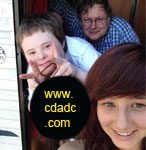

Computer Professions and People with Down Syndrome
Computers are opening up worlds for children with learning disabilities across the entire spectrum.
Children with problems ranging from autism to Down’s Syndrome are starting to show the benefits that flexible computer software has to offer in training and job opportunities.
The reason that computers are capable of providing this kind of benefit is because research is starting to show that a learning disability does not always equal lack of intelligence, only a problem in accepting and processing new information.
Work options for people with Down Syndrome in times past
In times past, people with Down Syndrome had some distinct disadvantages in finding work they could do.
In the era before computers, if you couldn’t read well, write well by hand, or process spoken information as fast as your co-workers could talk, you were going to have some problems.
In addition, people who had social problems were at a distinct disadvantage, because so much of a work environment depended on the ability to pick up on unspoken cues and signals. This sort of environment pretty much doomed those with learning disabilities to menial labor at best.
Janitorial labor, supervised groundskeeping, and other “undesirable” jobs were often the only things open to people with Down Syndrome, if they were allowed to work at all. In the past, people with Down Syndrome were often condemned to institutional life because it was “common knowledge” that they couldn’t really do anything.
Computers have helped change all of that for people with Down Syndrome.
Because a computer can be programmed to convey information through several different channels, the use of a computer can circumvent the difficulty of many learning disabilities experienced by people with Down Syndrome.
If a person with Down Syndrome has problems with reading due to dyslexia or poor eyesight, a computer can verbalize the information instead.
If a given person with Down Syndrome does better with kinetic learning, or in other words learns better by doing, then a computer can be programmed to teach in that way instead.
In short, a computer can get around a learning disability to allow someone with a learning disability to get the information the best way for that individual.
The world already learned the value of one group with learning disabilities, namely that of people with higher-functioning autism. Before computers these people were often seen as retarded at best. Now many of them are some of the top computer programming whizzes.
What latent talents will we find in people with Down Syndrome once we use the technology we have to bypass their learning disabilities?
Checklist of job requirements for people with Down Syndrome.
It’s almost impossible to set down a checklist of job requirements for people with Down Syndrome.
The genetic disorder of Down Syndrome manifests itself differently for each and every individual.
Where one person with Down Syndrome might need instructions repeated a number of times, another may need a written, visual checklist instead.
The job and its requirements will have to be tailor-fit to each person with Down Syndrome. However, the cost for doing this tailoring need not be high. In many cases, all it takes is an honest assessment of the capabilities of the person in question, and a bit of work to accomodate those capabilites most efficiently.
Computers, of course, make this easy today.
Jobs and Careers that people with Down Syndrome can now pursue.
Data entry
One of the jobs that many people with Down Syndrome can usually do easily is data entry.
Companies always need information put into databases.
Some training is required to teach the new employee the form that the original data comes on and the fields of the database.
Another, related area is data migration from one database to the other. If the data migration has to be done by hand, and many do, someone with Down Syndrome can usually do it just as efficiently as anyone else.
Typesetting and transcription
Another job that people with Down Syndrome can excel at is typesetting and transcription.
We already know that typing is a skill that often comes relatively easily to people with learning disorders as the letters aren’t as difficult for them to read, understand and reproduce as handwriting.
Because of computers, typesetting no longer requires large, complicated dangerous equipment or machinery.
Instead, if the typesetter can be trained to work on a computer, he or she can typeset just fine.
Art and graphic design
Many people with Down Syndrome have a finely developed sense of aesthetics.
Art and graphic design are two areas where computers can let someone’s artistic abilities really shine.
With the advent of programs customized to work for people with Down Syndrome, many excellent artists have begun to release their work on the Internet.
If a graphic designer with Down Syndrome can have the parameters of a given design sufficiently explained, he or she can produce a work of beauty that’s more than capable of competing with any other.
Digital photography
In a related field, computers have opened up the world of digital photography to people with Down Syndrome.
A photographer used to need a huge amount of equipment and the ability to work with a multitude of dangerous chemicals in order to be a successful photographer.
Back then, the ability to see beauty through a shutter was only a small part of the business.
With the combination of digital cameras and the programs for manipulating them that computers have brought to the open market, those stringent requirements are a thing of the past.
Because of advances in digital photography, photographers with Down’s Syndrome have produced bodies of work good enough to hang in galleries.
Administrative assistants
Yet another field opening up to people with Down Syndrome is the world of administrative assistants.
Many people with Down Syndrome are perfectly capable of answering phones and fielding emails.
They can take messages, they can make phone connections, and they can either reply to emails with pre-written form emails or forward an email to the person who needs it as long as requirements and standards are explained well.
People with Down Syndrome can also sort physical mail coming in a lot easier, with the interactive diagrams a computer can provide.
If a given potential employee’s physical speech and hearing capabilities are good enough to handle the job, he or she can probably be an excellent administrative assistant.
Pharmacy technician
An area that many probably wouldn’t consider is the job of pharmacy technician.
Pharmacy technicians are in charge of filling prescription medication before a pharmacist checks it.
While some things would need to be explained carefully, a person with Down Syndrome is often more than capable of reading and following filling instructions on a computer screen.
Each and every prescription is checked by a pharmacist before leaving the pharmacy, so there is a safety net already in place.
While I wouldn’t recommend a retail pharmacy position for anyone with Down Syndrome at the moment, a filling job in a remote warehouse where the technician is not responsible for handling customer complaints is well within the capabilities of anyone who can read and act upon presented information.
(In case your wondering, People with Down Syndrome actually do train and fill positions of Pharmacy Technicians – not something we ever really hear about)
Shipping
Shipping is yet another job classification computers bring within reach.
Good handwriting and ability to keep complex systems in one’s head are no longer required.
No matter what kind of warehouse environment or what kind of product is being shipped, a computer can give precise instructions on what to pack and how to pack it.
The computer also keeps track of what has been already done, and even prints out the label all ready to stick on and go.
Occupations that appear to be too challenging currently for people with Down Syndrome.
The jobs where an employee will have to deal with people and all their complications on a moment to moment basis is probably not the best place for someone with a learning or social disability.
Intense social situations will always remain the most complicated and problematic for any employee, learning problem or no.
However, in the era before computers, every job required the ability to pick up and act upon those complicated social cues.
Today, on the other hand, there are a myriad of jobs that do not require the ability to grasp and solve social problems in order to get the job done.
Any job that has set requirements that do not change day to day can probably be done by someone with Down Syndrome as well as someone without.
Children with Down Syndrome are growing up with computers as an organic part of their lives.
Children with Down Syndrome often interact socially on the Internet as peers whether in forums or playing games.
The level of stimulus and interaction they’re recieving from this level of play is going a long way to increasing their abilities across the spectrum.
Who knows what unique perspectives, abilities, and strengths they’ll show as computers play an ever increasing part in our everyday lives?
Are computers the end all and be all of existence for anyone? Of course not.
What computers can do is remove many of the limitations and shortfalls of education and work that kept people with Down Syndrome from fully participating in our world.
Our responsibility as a community is to determine the individual strengths and weaknesses of people with Down Syndrome.
Because the disorder of Down Syndrome manifests differently for each and every person, we must help them find or create the circumstances that will allow them to achieve.
We must also act as advocates for people with Down Syndrome, showing employers how people with Down Syndrome can actually benefit the company they work for.
Through education and understanding, future generations of children with Down Syndrome have hope of becoming full integrated members of the world we share.
Research and Main write by Loni Ice, minor editing by Donald Urquhart

Leave a Reply
You must be logged in to post a comment.